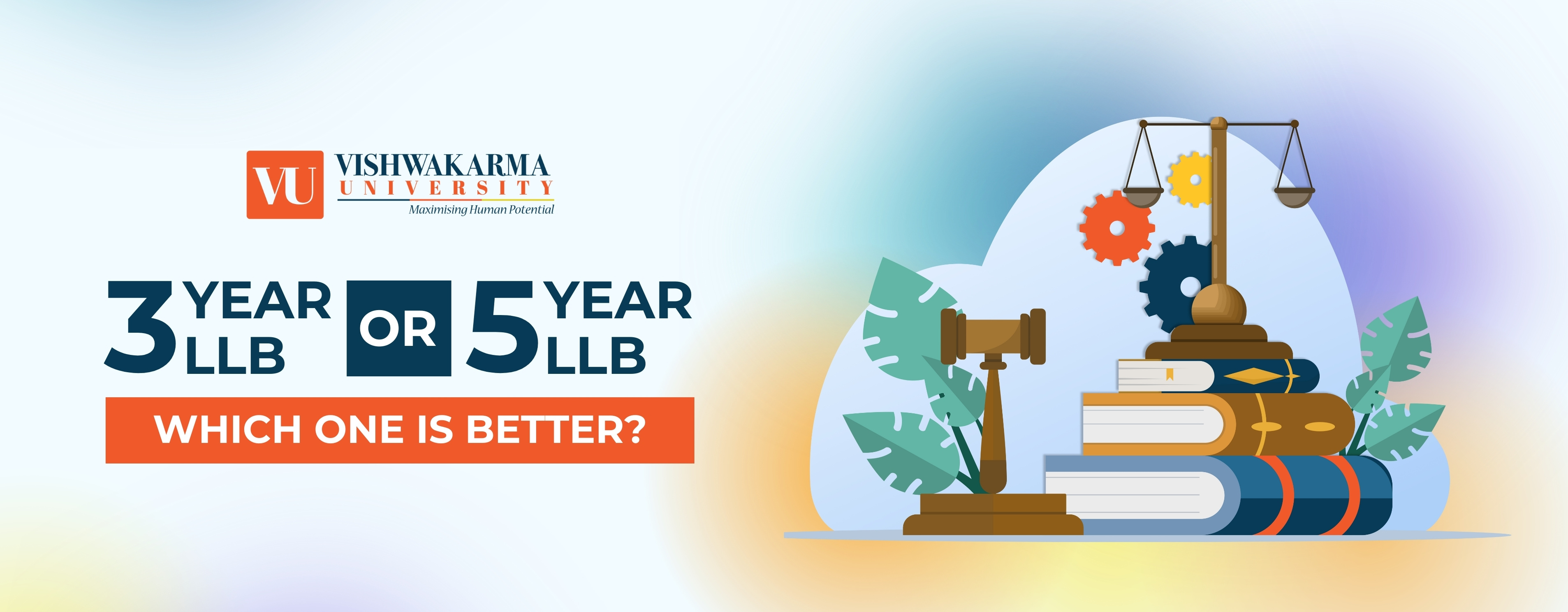Pursuing a career in law is a significant commitment, and choosing the right LLB course is crucial to your future success. One of the most common questions students face is whether to opt for a 3-year LLB or a 5-year integrated LLB. Both law courses have their own set of benefits, but they also differ in terms of LLB course duration, eligibility, and curriculum. In this blog, we will discuss the key differences between the two programs, including law course duration, fees, and career outcomes, to help you make an informed decision.
What is a 3-Year LLB Course?
The 3-year LLB course is a traditional law program available to students who have already completed their graduation. This course focuses solely on legal education without any other academic disciplines.
- Eligibility for LLB after graduation: To enroll in a 3-year LLB program, candidates must have a bachelor’s degree in any stream from a recognized university.
- LLB course duration after graduation: The LLB duration for this program is 3 years, split into six semesters.
- Subjects Covered: This program focuses exclusively on law subjects like constitutional law, criminal law, and contract law.
Table 1: Overview of 3-Year LLB Course
|
Criteria |
Details |
|
Eligibility |
Graduation in any discipline |
|
LLB Course Duration |
3 years |
|
Focus |
Legal education |
|
LLB Course Fees |
INR 50,000 to 2,00,000/year |
|
Degree Awarded |
LLB |
What is a 5-Year LLB Course?
The LLB 5-year course is an integrated law program designed for students who wish to pursue law immediately after completing their 12th grade. This course combines a bachelor’s degree with an LLB, offering both legal education and a foundational degree in arts, commerce, or science.
- Eligibility for LLB Course After 12th: The 5-year LLB is open to students who have completed their 12th with a minimum required percentage, typically around 50%.
- BA LLB Course Duration: The integrated program runs for 5 years, combining general subjects with law subjects like tort law, property law, and human rights law.
- Difference Between LLB and BA LLB: The primary difference between LLB and BA LLB lies in the additional non-law subjects you study in the 5-year program, offering a broader educational experience.
Table 2: Overview of 5-Year LLB Course
|
Criteria |
Details |
|
Eligibility |
12th grade completion |
|
BA LLB Course Duration |
5 years |
|
Focus |
Law + General education |
|
LLB Course Fees |
INR 1,00,000 to 5,00,000/year |
|
Degree Awarded |
BA LLB, BBA LLB, or B.Sc. LLB |
Key Differences Between 3-Year LLB and 5-Year LLB
1. Eligibility Criteria
- 3-Year LLB: Only graduates can apply. The eligibility for LLB after graduation requires candidates to hold a bachelor’s degree.
- 5-Year LLB: Designed for students straight out of 12th grade, combining undergraduate studies with legal education.
2. LLB Course Duration
- 3-Year LLB: A quicker route, with the LLB course duration after graduation being 3 years.
- 5-Year LLB: A longer commitment, with the BA LLB course duration extending to 5 years, but it integrates undergraduate and law studies, saving a year compared to completing a separate undergraduate degree followed by a 3-year LLB.
3. Curriculum
- 3-Year LLB: Exclusively focused on law subjects, ideal for those who want to quickly specialize in law.
- 5-Year LLB: Combines law with other subjects like humanities or commerce, providing a broader educational foundation.
4. Career Flexibility
- 3-Year LLB: Offers faster entry into legal professions, suitable for students who decide to pursue law later in their academic journey.
- 5-Year LLB: Provides flexibility with a dual qualification, giving students an edge if they wish to explore other fields apart from law.
Which LLB Course is Better for You?
Choosing between the 3-year LLB and the 5-year LLB depends on your academic background and career goals. Here's a quick breakdown:
Opt for the 3-Year LLB If:
- You have already completed an undergraduate degree and are looking to specialize in law.
- You want a more focused and shorter route to becoming a lawyer.
- You prefer studying only legal subjects without the addition of general education courses.
Opt for the 5-Year LLB If:
- You are certain about pursuing a career in law immediately after 12th.
- You want a comprehensive program that includes both general education and law.
- You prefer having the flexibility of dual qualifications (e.g., BA + LLB).
LLB Course Fees and Financial Considerations
Another important aspect when choosing between the two is the LLB course fees. The 5-year integrated programs are generally more expensive due to the longer duration and dual qualifications, while the 3-year LLB course fees are more affordable as it's shorter and focused only on law.
Table 3: LLB Course Fees Comparison
|
Program |
Average Annual Fees |
|
3-Year LLB Course |
INR 50,000 – 2,00,000/year |
|
5-Year LLB Course |
INR 1,00,000 – 5,00,000/year |
Key Takeaways
- LLB how many years? The LLB degree duration for the 3-year program is shorter, while the 5-year program includes an integrated degree with broader career possibilities.
- Law Syllabus: The 3-year LLB focuses strictly on law subjects, while the BA LLB course duration covers general subjects like political science, history, or commerce along with legal education.
- LLB Degree: Both options ultimately lead to an LLB degree, but the choice between the two depends on your career aspirations and how early you wish to specialize in law.
FAQs
Q1: What is the LLB course duration after graduation?
- A1: The LLB course duration after graduation is 3 years for students who have already completed an undergraduate degree in any stream.
Q2: What is the difference between LLB and BA LLB?
- A2: The difference between LLB and BA LLB is that the LLB is a 3-year specialized law course taken after graduation, while the BA LLB course duration is 5 years and combines law with general subjects like arts or commerce.
Q3: How many years does it take to complete a law course?
- A3: The law years of study vary; the LLB duration is 3 years if pursued after graduation, and 5 years if taken as an integrated program right after 12th.
Q4: What is the eligibility for LLB after graduation?
- A4: To be eligible for the 3-year LLB course, candidates must have a bachelor's degree from a recognized university.
Conclusion
Both the 3-year LLB and 5-year LLB courses offer solid career paths, but the choice depends on your current academic standing and future aspirations. If you're looking for a quick transition into the legal field after graduation, the 3-year LLB might be your best bet. However, if you're ready to dive into law right after 12th grade and want a comprehensive education, the 5-year LLB course could be the right choice.




